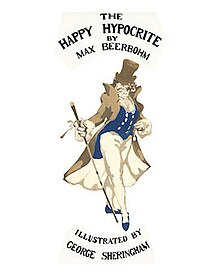
The Picture of Dorian Gray is a philosophical novel by Irish writer Oscar Wilde. A shorter novella-length version was published in the July 1890 issue of the American periodical Lippincott's Monthly Magazine. The novel-length version was published in April 1891.
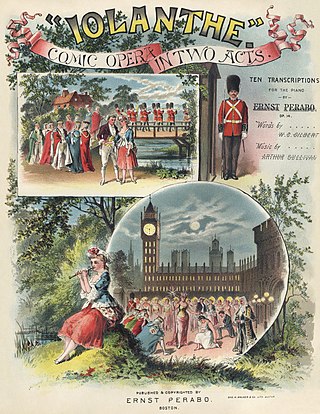
Iolanthe; or, The Peer and the Peri is a comic opera with music by Arthur Sullivan and libretto by W. S. Gilbert, first performed in 1882. It is one of the Savoy operas and is the seventh of fourteen operatic collaborations by Gilbert and Sullivan. In the opera, the fairy Iolanthe has been banished from fairyland because she married a mortal; this is forbidden by fairy law. Her son, Strephon, is an Arcadian shepherd who wants to marry Phyllis, a Ward of Chancery. All the members of the House of Peers also want to marry Phyllis. When Phyllis sees Strephon hugging a young woman, she assumes the worst and sets off a climactic confrontation between the peers and the fairies. The opera satirises many aspects of British government, law and society. The confrontation between the fairies and the peers is a version of one of Gilbert's favourite themes: a tranquil civilisation of women is disrupted by a male-dominated world through the discovery of mortal love.

Sir Herbert Beerbohm Tree was an English actor and theatre manager.

Sir Henry Maximilian Beerbohm was an English essayist, parodist and caricaturist under the signature Max. He first became known in the 1890s as a dandy and a humorist. He was the drama critic for the Saturday Review from 1898 until 1910, when he relocated to Rapallo, Italy. In his later years he was popular for his occasional radio broadcasts. Among his best-known works is his only novel, Zuleika Dobson, published in 1911. His caricatures, drawn usually in pen or pencil with muted watercolour tinting, are in many public collections.

The History of Tom Jones, a Foundling, often known simply as Tom Jones, is a comic novel by English playwright and novelist Henry Fielding. It is a Bildungsroman and a picaresque novel. It was first published on 28 February 1749 in London and is among the earliest English works to be classified as a novel. It is the earliest novel mentioned by W. Somerset Maugham in his 1948 book Great Novelists and Their Novels among the ten best novels of the world.

"Beauty and the Beast" is a fairy tale written by French novelist Gabrielle-Suzanne Barbot de Villeneuve and published in 1740 in La Jeune Américaine et les contes marins. Her lengthy version was abridged, rewritten, and published by French novelist Jeanne-Marie Leprince de Beaumont in 1756 in Magasin des enfants to produce the version most commonly retold. Later, Andrew Lang retold the story in Blue Fairy Book, a part of the Fairy Book series, in 1889. The fairy tale was influenced by Ancient Greek stories such as "Cupid and Psyche" from The Golden Ass, written by Lucius Apuleius Madaurensis in the second century AD, and "The Pig King", an Italian fairytale published by Giovanni Francesco Straparola in The Facetious Nights of Straparola around 1550.

A happy ending is an ending of the plot of a work of fiction in which almost everything turns out for the best for the main protagonists and their sidekicks, while the main villains/antagonists are defeated.

Marius Re Goring, was an English stage and screen actor. He is best remembered for the four films he made with Powell & Pressburger, particularly as Conductor 71 in A Matter of Life and Death and as Julian Craster in The Red Shoes. He is also known for playing the title role in the long-running TV drama series, The Expert. He regularly performed French and German roles, and was frequently cast in the latter because of his name, coupled with his red-gold hair and blue eyes. However, in a 1965 interview, he explained that he was not of German descent, stating that "Goring is a completely English name."
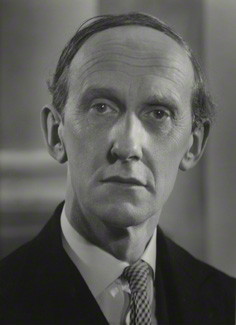
Lord Edward Christian David Gascoyne-Cecil, CH was a British biographer, historian, and scholar. He held the style of "Lord" by courtesy, as a younger son of a marquess.
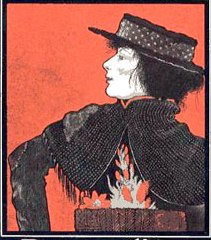
Pygmalion is a play by Irish playwright George Bernard Shaw, named after the Greek mythological figure. It premièred at the Hofburg Theatre in Vienna on 16 October 1913 and was first presented on stage in German. Its English-language première took place at His Majesty's Theatre in London's West End in April 1914 and starred Herbert Beerbohm Tree as phonetics professor Henry Higgins and Mrs Patrick Campbell as Cockney flower-girl Eliza Doolittle.
"The Lagoon" is a short story by Joseph Conrad composed in 1896 and first published in The Cornhill Magazine in January 1897. The work was collected in Conrad’s first volume of short stories Tales of Unrest (1898).
Christopher Godwin is a British actor who has been active since the late 1960s.
George Sheringham was a British painter and theatre designer. One of the first recipients of the Royal Designers for Industry distinction in 1937, he is remembered for his work for the D’Oyly Carte Opera Company.

Dorian Gray is a 2009 British dark fantasy horror film based on Oscar Wilde's 1890 novel The Picture of Dorian Gray, directed by Oliver Parker, and written by Toby Finlay. The film stars Ben Barnes, Colin Firth, Rebecca Hall, Ben Chaplin, Emilia Fox, and Rachel Hurd-Wood. It tells the story of the title character, an attractive Englishman whose loveliness and spirit are captured in an enchanted painting that keeps him from aging. His portrait becomes further tainted with every sin he commits while he remains young and handsome.

This is a bibliography of works by Oscar Wilde, a late-Victorian Irish writer. Chiefly remembered today as a playwright, especially for The Importance of Being Earnest, and as the author of The Picture of Dorian Gray; Wilde's oeuvre includes criticism, poetry, children's fiction, and a large selection of reviews, lectures and journalism. His private correspondence has also been published.

Julius Beerbohm was a Victorian travel-writer, engineer and explorer.
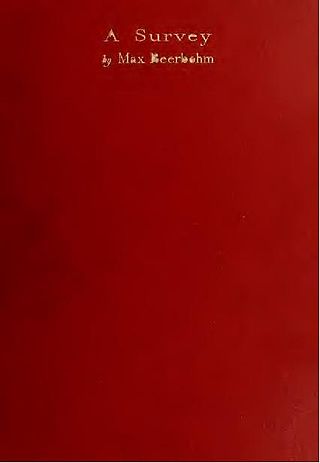
A Survey is a book of fifty-two caricatures and humorous illustrations by British essayist, caricaturist and parodist Max Beerbohm. It was published in Britain in 1921 by William Heinemann and in the United States in the same year by Doubleday, Page & Company of New York City.
Pact with the Devil, known in Canada as Dorian, is a 2004 Canadian-British drama film directed by Allan A. Goldstein and starring Ethan Erickson, Malcolm McDowell and Christoph Waltz. It is a modern retelling of the Oscar Wilde novel The Picture of Dorian Gray. It was filmed in 2002 in Canada.

Dorian Gray is a fictional character and the anti-hero of Oscar Wilde's 1890 novel The Picture of Dorian Gray. He is an aristocratic Victorian man.
